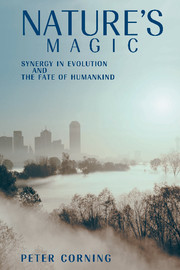Book contents
- Frontmatter
- Contents
- 1 Prologue: The New Evolutionary Paradigm
- 2 The “Enchanted Loom”
- 3 The Magic Castle
- 4 “Black Magic”
- 5 The Synergism Hypothesis
- 6 “The Sorcerer's Apprentice”
- 7 Conjuring Human Evolution: The Synergistic Ape
- 8 Conjuring History: Does Cultural Evolution Have an “Arrow”?
- 9 The Science of History
- 10 Conjuring the Future: What Can We Predict?
- Afterword
- Notes
- References
- Index
Afterword
Published online by Cambridge University Press: 22 August 2009
- Frontmatter
- Contents
- 1 Prologue: The New Evolutionary Paradigm
- 2 The “Enchanted Loom”
- 3 The Magic Castle
- 4 “Black Magic”
- 5 The Synergism Hypothesis
- 6 “The Sorcerer's Apprentice”
- 7 Conjuring Human Evolution: The Synergistic Ape
- 8 Conjuring History: Does Cultural Evolution Have an “Arrow”?
- 9 The Science of History
- 10 Conjuring the Future: What Can We Predict?
- Afterword
- Notes
- References
- Index
Summary
Winston Churchill – a prolific author (among his other accomplishments) – once remarked that you never finish writing a book, you merely abandon it. In an age when scientific developments seem to come with breathtaking speed and new books and journal articles flood in daily over the transom, it seems harder than ever to let go of a manuscript.
In Chapter 5 (above), in the course of re-introducing the “Synergism Hypothesis,” I took the liberty of borrowing a timeless metaphor from Shakespeare. If there is indeed a tide in the affairs of men, it may account in part for the vicissitudes of this theory since it was first introduced in 1983; it seems that the Synergism Hypothesis may be an idea whose time has finally come. But, to borrow another nautical metaphor, “the tide waits for no man.” This “Afterword” is a concession to that imperative. I will mention just a few of the developments – and hindsights – that would otherwise have missed the outgoing tide.
The Bioeconomics of Evolution
One important development/hindsight that deserves to be emphasized concerns the growing relationship between biology and economics. The Synergism Hypothesis is, quintessentially, an economic theory of cooperation and complexity in evolution. To repeat, the key theoretical claim is that the “payoffs” produced by various kinds of synergy are responsible for the evolution of complexity in nature, and in human evolution.
- Type
- Chapter
- Information
- Nature's MagicSynergy in Evolution and the Fate of Humankind, pp. 320 - 324Publisher: Cambridge University PressPrint publication year: 2003



